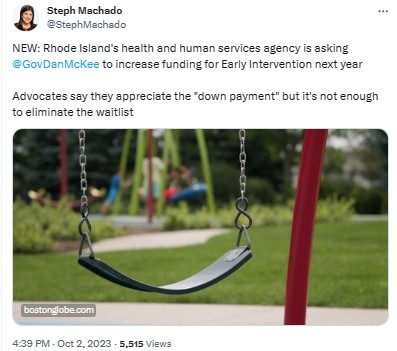On WNRI 1380 AM/95.1 FM, John DePetro and Justin Katz discuss:
- Crowley feted as the air to RI’s union throne
- RI embarrassed by wandering quahogs
- Denouncing “hate crime” to set the narrative before it can be disproven
- Finding Patriotic Day divisive during public school Spirit Week
- The party of socialism and anti-Semitism lets the mask slip
- Cannabis reveals some of the old, corrupt lines in the Ocean State
Featured image by Justin Katz using Firefly AI and Photoshop with AI assist.
[Open full post]But I have to wonder: as these groups come forward demanding more money, is anybody — whether journalists or state agencies — investigating the services that are being provided, the mandates imposed on the providers, or the nuts and bolts of the organizations providing them?

Such stories typically evince no trace of skepticism about the claims of the providers and to be based wholly on the assumption that they’re selfless and doing all that can be done for all the right reasons. Maybe they are, maybe they’re not, or maybe they’re good people caught in a corrupt system, but journalists seem seamlessly and maybe unconsciously to jump from the existence of a problem to the conclusion that more money is the answer.
[Open full post]Conversations related to the Washington Trust settlement with the government, requiring the bank to address alleged racial discrimination on its part, indicate two views or standards for handling blame in society.
One side is convinced that somebody is to blame for the circumstances of life and that the job of society (particularly government) is to find people and organizations on which to pin that blame and impose a consequence for “justice.” The fact that a rationale or investigative methodology is able to assign blame is, of itself, proof that the rationale or methodology is valuable and accurate.
The other side believes that blame isn’t so direct, simplistic, or easy to assign and, therefore, thinks it is the burden of society (particularly government) to prove that an individual or organization truly is to blame for a specific result before imposing consequences.
The first is the conduct of an easily guided mob. The second provides a path to civilization and true justice.
[Open full post]The US Bureau of Labor Statistics reports (Page 11) that as of the fourth quarter of 2022, Rhode Island has fifty dealerships that sell new cars. Note that this figure does not include dealerships selling new trucks, new buses, new motor homes, new motorcycles, et etera.
Governor Dan McKee’s proposed 2024 budget, Page 158 of the Executive Summary, projects sales tax revenue from “Motor Vehicles” for 2024 at $117,200,000, falling modestly to $103,404,368 for FY 2028.
Now add to the state’s annual budget the income tax it collects on the roughly $200,000,000+ in wages from the thousands of people employed by those dealerships.
Why am I bringing this up? Because Rhode Island is poised to implement “Advanced Clean Cars II (ACCII) & Advanced Clean Trucks (ACT)” rule which would implement H6055/S0195, passed in May by the Rhode Island General Assembly and signed by Governor McKee [Correction, 12/8/23: ACT and ACCII were not passed by the General Assembly; H6055 was heard and held in committee; the hearing on S0195 was “postponed”. Governor McKee is implementing by executive order.] ACCII and ACT would
… require that, by 2035, all new cars imported for sale in Rhode Island be non-gas powered.
… actually, non-gas AND non-diesel powered. In other words, all new vehicles sold in Rhode Island would have to be electric.
Nothing about this initiative is tethered to reality. Car manufacturers have no obligation to make these vehicles. Rhode Islanders have no obligation to purchase them and lots do not have either the interest or the means to do so.
Rhode Island’s electric grid does not have the capacity to accommodate the corresponding stepped up demand. Charging infrastructure in the state for cars is woefully inadequate; for big rigs, all but non-existent.
The impact of Rhode Island going to zero emissions will have no impact on global warming, as John Kerry himself has effectively said.
“The United States could go to zero tomorrow—I mean we can’t but if you’re figuratively speaking could go to zero—we’d still have a problem. The world would still have a problem,” Kerry told Washington Post columnist Jonathan Capehart. He continued, “If China went to zero tomorrow with the United States, we’d still have a problem. …”
With regard to supply, we are watching in real time as manufacturers pull back on the production of electric cars because consumer demand for them has cooled. No kidding. People cannot afford them, which even the New York Times acknowledges.
Buyers remain interested in electric vehicles, surveys show, but struggle to afford them. The average price paid for an electric vehicle in the United States was less than $51,000 in September, according to Cox Automotive. That’s a huge decline from last year’s $65,000. But it’s still too high for many new-car buyers, especially as high interest rates have made monthly car payments more expensive.
We learned recently, thanks to the Hummel Report, that the State of Rhode Island itself failed to achieve a 25% change-over of its fleet to “clean” electric vehicles in a ten year timeframe.
If the state itself, with all of its resources, cannot meet even a modest target for changing to electric vehicles, that speaks volumes about the practicality for us ordinary folk and ordinary businesses of complying with ACCII and ACT.
As to practical impact. What happens if the sale of fossil fuel vehicles are banned but they are not replaced with electric vehicles, either in dealerships because manufacturers stop making them or by Rhode Islanders because they cannot afford them – AS HAS ALREADY STARTED HAPPENING? With no customers and no inventory, dealerships close or relocate out of state.
In short, if ACCII and ACT are implemented, there is a real risk that Rhode Island won’t get “clean” cars but will get cleaned out of new vehicle dealerships and a whole lot of tax revenue.
[Open full post]On WNRI 1380 AM/95.1 FM, John DePetro and Justin Katz discuss:
- What the CD1 results suggest for Rhode Island Republicans
- What Cicilline is trying to get away with from the RI Foundation
- What Baldelli-Hunt’s resignation suggests
- Why the judge cares about Neronha’s tweets (and what Neronha wants)
- How the Providence Journal is securing its representation of classic journalistic principle
Featured image by Justin Katz using Dall-E 3 and Photoshop with AI assist.
[Open full post]The other day, I wondered whether younger folks have any sense of how long-standing is the problem of the huge gray area between journalists within the Palestinian territories (and elsewhere in the Middle East) and the terrorist organizations they’re covering. Whether or not they’re more like terrorist propagandists is a gray area the terrorists have long manipulated.
The topic is now front and center, with images around social media of an AP reporter hugging Hamas leaders and apparently speeding toward the October 7 massacre with a grenade in his hand. Personally, I’m sympathetic with those who see no moral doubt on the point, but it is a classic question of journalist ethics that people debate (or used to debate, anyway). If you’re a journalist embedded with a militant faction and learn that they are planning an attack, should you warn the other side?
The question seems more difficult when it comes to official militaries in a declared war, because that’s much more clearly documenting the blundering trail of history. Everybody involved understands it’s a contest of killing and destruction, and the world, writ large, has an interest in increasing documentation, not the least so that the rules of war, such as they are, can be maintained over time. Everybody has an interest in the factions’ willingness to give journalists access.
In this case, though, with terrorists heading toward civilian areas on the way to a massacre of civilians, complete with rape and baby beheadings, the moral question evaporates, especially when the monsters were content to document it themselves. There’s no excuse that doesn’t have the “journalist” counted among the terrorists.
[Open full post]Surprising absolutely nobody, Democrat Gabe Amo won the available Congressional seat in Rhode Island yesterday. For those who really get into local politics, the thrill of the bet in such races is predicting whether the Republican will come in closer to 30% or closer to 35%. Gerry Leonard hit the 35%, so congratulations to him.
Because the outcome was so predictable, the Democrats didn’t even have to ramp up their mail ballot machine too much. Despite overall higher turnout in the general election (in total and for each party), Democrats collected more mail ballots when the race mattered. (Of course, an outside portion of those went to a single longshot candidate in the primary whose performance was eye-opening for anybody willing to open them.)
Even so, the role of mail ballots is conspicuous. Amo won them with 83% of the vote. His margin of victory was 19,561, 20% of which came from mail ballots even though mail ballots were only 9% of the total for all candidates. In Providence, Amo took 93% of mail ballots and 90% of votes overall. That one city contributed 24% of his margin of victory.
To be sure, Leonard won only a single municipality, Woonsocket, and by a slender margin of 114 votes, but the numbers provide two clear and important lessons. Republicans have to neutralize the mail ballot machine, either by (my preference) persuading voters that it spells the death of democracy, whatever their individual political beliefs, or by finding a way to turn it to their advantage, in which case the ruling Democrats will likely notice the harm that they do. Republicans also have to find a way to reach urban voters, which will be the bigger challenge.
Adding to the mix results from the recent special election for city council in Cranston produces an additional lesson. In that relatively conservative city, Democrat Dan Wall won by 216 votes, 62% of which were mail ballots and only 10% of which were election day votes. However, his closest competitor, Republican Anthony Melillo faced an additional handicap: independent candidates who surely harmed him more than his opponent and claimed 143 votes.
If Republicans must find a way to work together and keep allies aligned in order to be effective statewide on mail ballots and in the effort to make progress in Providence, they definitely have to do so in order to stop cannibalizing each other’s votes directly.
Featured image by Obi Onyeador on Unsplash.
[Open full post]Consider this tweet from WPRI’s Ted Nesi as an indication of the dehumanizing aspect of the fashionable “community” phrase:

This politically correct practice allows 80 people to stand in for a “community” of nearly 20,000 people. It’s careless identity politics, and it’s ideologically corrupt. How do 80 people get to speak for 20,000? Does Ted Nesi review a poll or survey the population? No. When it serves the progressive line, the speakers are part of the “community.” When it doesn’t serve the progressive line, different language will be used — “some Jews” or the like.
[Open full post]If “genocide” on the other side of the world justifies defacing statues, vandalizing buildings, and shouting down speakers, it will justify violence.
[Open full post]







